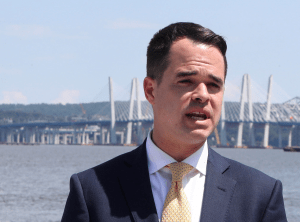|
RCBJ-Audible (Listen For Free)
|
The BitLicense Program Remains Up In The Air As Private Actors And Government Agencies Work To Create A Safe, Secure, Lucrative, And Accessible New York Crypto Market
By David Carlucci

Earlier this year, the New York State cryptocurrency regulatory regime made the news when Comptroller DiNapoli criticized the Department of Financial Services (DFS) oversight of the BitLicense approval process. Beyond that, the BitLicense program is rarely mentioned in New York’s mainstream headlines. This is because most of the BitLicense conversation is highly concentrated among industry experts and government officials, not the average crypto user. As cryptocurrencies become more prevalent in New York and nationwide, it is integral that every resident understands the regulatory regime overseeing their finances.
What are BitLicenses?
BitLicenses are licenses required and issued by the DFS for any business or individual involved with virtual currency activities. The program, which went into effect in 2015 following the enactment of Regulation 23 NYCRR Part 200 under the NYS Financial Services Law, is designed to regulate and oversee the virtual currency market, ensuring its security and stability.
It is important to note that a BitLicense is not required for the everyday crypto user or investor. The program applies only to those engaging in “virtual currency activities,” which the Financial Services Law outlines in the 2015 regulations. Overall, virtual currency activities include controlling virtual currencies on behalf of others, buying or selling virtual currencies as a customer business, or administering virtual currency, among other activities outlined in the regulations.
Acquiring a BitLicense – The Process & Its Criticisms
Businesses or individuals seeking BitLicenses must undergo a rigorous application process set by the DFS. This process involves providing biographical information, fingerprints, photographs, business history, insurance policies, banking information, and other personal data. Additionally, businesses must share an organizational chart, a description of business operations, all written policies, anti-laundering policies, and other business details, ensuring a comprehensive review.
Upon applying, the Superintendent investigates the financial and biographical data provided by the applicant to determine whether they are fit for a license. The Superintendent must approve or deny the application within 90 days of filing and with a hearing within at least ten days’ notice.
The initial cost of a BitLicense is $5 thousand, a standard business development expense. However, the total cost of initiating virtual currency activities can be significantly higher due to additional fees. The extensive documentation process often necessitates the hiring of legal and compliance professionals. Moreover, the time it takes to acquire a BitLicense can lead to hundreds of thousands of dollars in costs before approval.
Although the intense application process ensures financial security for the New York State economy, the BitLicense program has undergone significant scrutiny for closing off the crypto environment to smaller entrepreneurs. As of March 25, 2024, the DFS lists 34 license holders in New York. This list shrinks to just 28 when considering unique businesses. Among the group of roughly 30 businesses stand financial juggernauts like PayPal and Fidelity and cryptocurrency giants like Coinbase and Robinhood. With a majority of BitLicense holders being worth millions and, in some cases, billions, there is no question that there are concerns about the program’s accessibility to newer entrepreneurs.
The Current Regulatory State of the BitLicense
In 2020, DFS responded to these fears with a new avenue to licensure. The 2020 regulations allow prospective applicants to partner with established license holders and apply for a conditional license. In theory, this rule would make it easier for new businesses to enter the market. However, PayPal is the only company that has acquired a conditional license.
Four years later, BitLicenses made the news again in January 2024 due to a report from the Office of the Comptroller on DFS’s oversight of the BitLicense application process. In the report, Comptroller DiNapoli raised concerns that DFS has not accurately determined applicants’ financial or cybersecurity stability. The report lists multiple missing or old financial data instances and long lags between risk assessment and approval. DiNapoli also criticized DFS for failing to complete the fingerprinting process for two applicants and review compliance reports quarterly and annually. These criticisms highlight the need among the private and public sectors for continuous improvement in the BitLicense program.
DFS responded to the Comptroller, saying it had resolved all these issues before the audit. Since then, DFS made no alterations to the BitLicense regulatory regime directly related to the Comptroller’s report. The future of the BitLicense program remains up in the air as private actors and government agencies work to create a safe, secure, lucrative, and accessible New York crypto market.











